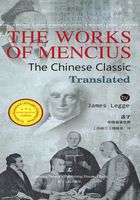
CHAPTER II
1. Mencius, another day, saw King Hûi of Liang.The king went and stood with him by a pond, and,looking round at the large geese and deer, said, 'Do wise and good princes also find pleasure in these things?'
2. Mencius replied, 'Being wise and good, they have pleasure in these things. If they are not wise and good, though they have these things, they do not find pleasure.


CHAPTER 2. RULERS MUST SHARE THEIR PLEASURES WTH THE PEOPLE. THEY CAN ONLY BE HAPPY WHEN THEY RULE OVER HAPPY SUBJECTS.
1. 王立,—'The king stood'; and the meaning is not that Mencius found him by the pond. The king seems to have receive d him graciously, and to have led him into the park. 于沼上,—compare Analects, VI. vii,but for which passage I should translate here—'over a pond', i.e. in some building over the water, such as is still very common in China. 鸿 means 'large geese',and 麋 is the name for a large kind of deer, but they are joined here, as adjectives, to 鴈 and 鹿. 贤者=贤者之君, 'worthy princes'. It does not refer to Mencius,as some make it out. The reply makes this plain. The king's inquiry is prompted by a sudden dissatisfaction with himself, for being occupied so much with such material gratifications, and= 'Amid all their cares of government do these pleasures find a place with good princes?'
3. See the Shih-ching, III. i. Ode VIII. et. I, a. The ode tells how his people delighted in king Wăn. For 鹤the Shih-ching reads 翯. 于 is read wû, an interjection. 古之人 referring to king Wăn, but put generally.
4. See the Shû-ching, IV. Bk. I. i. 3; —T'ang's announcement of his reasons for proceeding against the tyrant Chieh. The words quotes are those of the people. Chieh had pointed to the sun, saying that, as surely as the sun was in heaven, so firm was he on his throne. The people took up his words, and pointing to the sun, thus expressed their hatred of the tyrant,preferring death with him to life under him. 时=是;害 is read ho; 丧, in 4th tone. Châo Ch'I gives quite another turn to the quota ion, making the words an address of the people to T'ang:—'This day he (Chieh) must die. We will go with you to kill him.' Chû His view is to be preferred. I do not think that the last two clauses are to be understood generally:—'When the people wish to die with a prince', &c. They must specially refer to Chieh.


3. 'It is said in the Book of Poetry,
"He measured out and commenced his marvellous tower;
"He measured it out and planned it.
The people addressed themselves to it,
And in less than a day completed it.
When he measured and began it, he said to them –Be not so earnest:
But the multitudes came as if they had been his children.
The king was in his marvellous park;
The does reposed about,
The does so sleek and fat:
And the white birds shone glistening.
The king was by his marvellous pond;
How full was it of fishes leaping about!"
'King Wăn used the strength of the people to make his tower and his pond, and yet the people rejoiced to do the work, calling the tower "the marvellous tower",calling the pond "the marvellous pond", and rejoicing that he had his large deer, his fishes, and turtles. The ancients caused the people to have pleasure as well as themselves, and therefore they could enjoy it.


CHAPTER 3. HALF MEASURES ARE OF LITTLE USE. THE CREAT PRINCIPLES OF ROYAL GOVERNMENT MUST BE FAITHFULLY AND IN THEIR SPIRIT CARRIED OUT.
1. The combination of particles—焉耳矣—gives emphasis to the king's profession of his own devotedness to his kingdom. 寡人 was the designation of themselves used by the princes in speaking to their people,=寡德之人 'I, the man of small virtue.' I shall hereafter simply render it by 'I'. Liang was on the south of the river, i.e. the Ho, or Yellow river,but portions of the Wei territory lay on the other side, or north of the river. This was called the inside of the river, because the ancient royal capitals had mostly been there, in the province of Ch'i (冀州),comprehending the present Shan-hai; and the country north of the Ho, looked at from them, was of course'within', or on this side of it. 粟,—now used commonly for millet and maize, but here for grain generally. 加少,加多; literally, 'add fee, add many'. To explain the 加,it is said the expressions=分外少, 分外多, 'not fewer,nor longer, than they should for such States be'.


4. 'In the Declaration of T'ang it is said, "O sun,when wilt thou expire? We will die together with thee." The people wished for Chieh's death, though they should die with him. Although he had towers,ponds, birds, and animals, how could he have pleasure alone?'